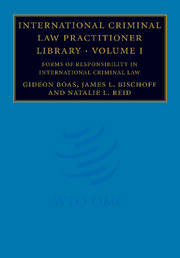Book contents
- Frontmatter
- Contents
- Foreword
- Table of authorities
- 1 Introduction
- 2 Joint criminal enterprise
- 3 Superior responsibility
- 4 Complicity and aiding and abetting
- 5 Planning, instigating and ordering
- 6 Concurrent convictions and sentencing
- 7 Conclusion
- Annex: Elements of forms of responsibility in international criminal law
- Index
7 - Conclusion
Published online by Cambridge University Press: 08 January 2010
- Frontmatter
- Contents
- Foreword
- Table of authorities
- 1 Introduction
- 2 Joint criminal enterprise
- 3 Superior responsibility
- 4 Complicity and aiding and abetting
- 5 Planning, instigating and ordering
- 6 Concurrent convictions and sentencing
- 7 Conclusion
- Annex: Elements of forms of responsibility in international criminal law
- Index
Summary
As the preceding chapters have shown, the forms of responsibility play an extremely important role in international criminal adjudication, and a significant part of the jurisprudence of the ad hoc Tribunals has been devoted to their identification, elaboration and application. The extent of that effort, and the degree of controversy surrounding certain of the forms of responsibility, may seem surprising to the domestic practitioner, accustomed to the relatively settled law of a specific jurisdiction on these issues. Three particular characteristics of international criminal law explain the emphasis on and significance of the forms of responsibility.
First, the principal preoccupation of international criminal law is the ascription of personal penal liability to a wide range of individuals, with regard to criminal conduct that frequently extends over a broad geographic area and an extended period of time. The involvement of each individual may vary significantly, and it is the task of decision-makers in this area to ensure that the law is robust enough to capture all the participants in international crimes, yet precise enough to comply with the fundamental principle that an individual may only be punished for his own criminal conduct, which must bear a sufficiently significant relationship to the crimes charged.
Second, while international criminal law draws on the substantive and procedural law of several domestic jurisdictions, it remains a relatively new system of law, which must nonetheless deal with the complicated factual circumstances of the cases, and the unique demands of public international legal rules developed to regulate the conduct of hostilities and the treatment of civilians and civilian property in times of war and peace.
- Type
- Chapter
- Information
- International Criminal Law Practitioner Library , pp. 415 - 425Publisher: Cambridge University PressPrint publication year: 2008



